Iranian Football Fans Protest Palestinian Flag Amid Israel-Hamas Conflict
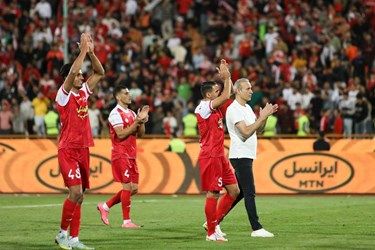
At a football match in Tehran, hundreds of Iranian fans chanted for the removal of Palestinian flags from the pitch on Sunday.

At a football match in Tehran, hundreds of Iranian fans chanted for the removal of Palestinian flags from the pitch on Sunday.
The protest was captured in viral videos circulating during the Israel-Hamas conflict. The death toll from the recent attacks had risen to at least 700 in Israel since Saturday.
Regime leadership has expressed support for Hamas, the Iran-backed militant group that launched hundreds of rockets at Israel. In Tehran, lawmakers were seen chanting slogans such as "Death to Israel, Death to America" on Saturday.
While the Islamic Republic's propaganda apparatus had organized street celebrations in support of the "Palestinian victory" in Tehran and other cities on Saturday evening, sources in Iran indicated that the participants were predominantly pro-regime and supporters of the Revolutionary Guards (IRGC) and their families. Ordinary Iranians had largely stayed away from these celebrations.
However, at the football match, a different sentiment emerged as Iranian fans voiced their opposition to Palestine. They could be heard shouting, "Take that Palestinian flag and shove it up your A**!"
Morgan Ortagus, a former US Department of State official, reacted to the video, expressing her admiration for the Iranian people.
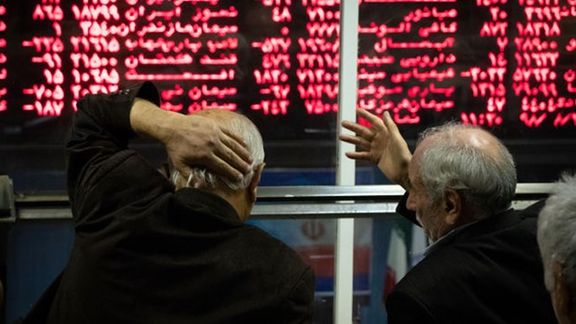
The bloody invasion of Israel by the Iran-backed Palestinian Hamas has caused a tumble in the Iranian economy, with the rial falling and stock market in decline.
The bloody invasion of Israel by the Iran-backed Palestinian Hamas has caused a tumble in the Iranian economy, with the rial falling and stock market in decline.
At the opening of trading day on Sunday, the Tehran Stock Exchange (TSE) crashed within just 30 minutes, with a sharp decline reported for almost all stocks on trade. Closing at 2.1 million points, the TSE main index dropped over 51 thousand points. The rial began to slightly fall late on Friday, before the attack, while the fall accelerated on Saturday. While for weeks the rial was hovering around 495,000 per US dollar, it broke through the 500,000 on Saturday and dropped to 520,000 on Sunday.
Iran's regime is openly supporting the horror which has seen over 2,000 Israelis wounded, at least 700 dead, and dozens abducted in Hamas's declaration of war, holding state-sponsored street ceremonies. President Ebrahim Raisi defended the atrocities as “the legitimate defense of the Palestinian nation” and held phone calls with Hamas leaders Ismail Haniyeh and Khaled Mashaal.
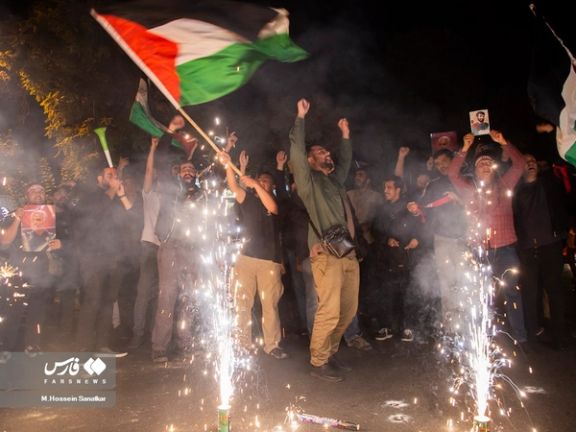
Tejarat News, a business website in Tehran, said in an article Sunday that the surge in the exchange rates of foreign currencies against the national currency rial is due to the developments in Israel. “Since Saturday, dollar traders are saying that tensions in Israel are the cause of the rise in the dollar's exchange rate,” the website said.
However, the impact of war was being felt in Israel too. According to Bloomberg, Israel’s stock exchange also witnessed the biggest drop since March 2020 and the outbreak of the pandemic while the shekel slumped towards a seven-year low in recent days, the war set to push that further. Israel has also faced a floundering economy amidst political instability since the return of the Netanyahu coalition at the start of the year which has plunged the country into economic and geopolitical turmoil.
The rial, however, has lost its value 12-fold since early 2018, when the United States withdrew from the JCPOA nuclear deal and imposed tough economic sanctions on Iran. This has made imports much more expensive and has led to inflation at around 50 percent for the past three years. Some officials and media in Tehran have been warning that tens of millions of people have fallen into poverty because of persistent high inflation, and this in turn has seriously contributed to political instability. Widespread anti-regime protests in 2022 and 2023 are partly attributed to financial hardships ordinary citizens face. For the transfer of such an amount to Iran, the greenlight by the US seems necessary given the country’s sanctions on the regime’s banking system.
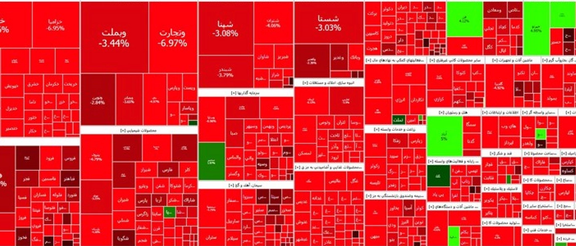
The sudden devaluation of the rial came a few weeks after Iran managed to get access to $6 billion of its assets that was blocked In South Korea due to US sanctions as part of a prisoner swap deal with Washington.
Whenever Iran’s economy is in a slump, regime officials start bragging about the positive prospects of releasing Iran’s frozen assets abroad on the control of inflation and freefall of rial, a propaganda line that never delivers. This time is no exception. Fars news agency, affiliated with the Revolutionary Guards, ran an article Sunday in line with Tehran’s effort for damage control, claiming that Iran’s unfrozen assets in South Korea and Luxembourg can have a positive psychological impact on the market.
The Central Bank of Iran (CBI) announced on Friday that Luxembourg has released $1.7 billion of Iran’s frozen funds, following a ruling issued by the country's Supreme Court. “This fund is now available to the Central Bank of Iran.” Former CBI Governor Abdolnasser Hemmati said in 2020 that Iran's assets were unfrozen despite an attempt by victims of terror to get the funds as compensation. In 2012, a New York court found there was evidence showing that the Islamic Republic provided "material support and resources to al Qaida for acts of terrorism".
In another case in 2023, a federal judge in New York ordered Iran's central bank and a European intermediary to pay out $1.68 billion to family members of troops killed in the 1983 bombing of the US Marine Corps barracks in Lebanon.
The attack has also ignited a wave of criticism directed at the Biden Administration over its deal with Iran and the release of funds that Iran is allegedly funneling to its proxies.
In May, Iran International reported that Hamas pressured the Islamic Republic into inviting its leader, Ismail Haniyeh, to Tehran hoping to get financial support. Our sources said that although the Islamic Republic continues to provide financial aid to Hamas despite its own economic situation, Tehran is not satisfied with the performance of the group against Israel.
While Hezbollah is by far Iran's richest and most powerful proxy, the combined funds of the Palestinian Islamic Jihad Movement, Hamas and the Popular Front for the Liberation of Palestine are enormous, Hamas and Islamic Jihad receiving a large share of Tehran’s aid. In March 2022, Haniyeh revealed that the Islamic Republic paid a total of $70 million to Hamas to help it develop missiles and defense systems. During an interview with Al-Jazeera, Haniyeh said different countries help in financing the group, but Iran is the biggest donor.
In 2018, US President Donald Trump’s special Middle East envoy Jason Greenblatt, who recently visited Israel's communities on the Gaza perimeter and toured the terror tunnel the IDF exploded, claimed Iran provided $100 million annually to Hamas compared to $700m annually to Hezbollah.
In a video on the official Al-Qassem Brigades' Telegram channel - the military wing of Hamas - published on Sunday, spokesman Abu Obaidah said, "We thank the Islamic Republic of Iran who provided us with weapons, money and other equipment. He gave us missiles to destroy Zionist fortresses, and helped us with standard anti-tank missiles."
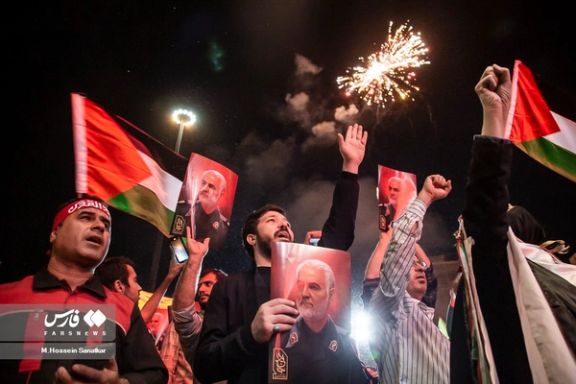
President Ebrahim Raisi and other regime officials praised Gazan militants for their terror attacks on Israel, but many ordinary Iranians resent this support.
Following separate phone talks Sunday with the Islamic Jihad leader Ziyad al-Nakhalah and Hamas Political Bureau Chief Ismail Haniyeh, Raisi issued a statement in which he said the Islamic Republic supports the “Palestinian nation’s lawful defense”.
Raisi accused Israel and its supporters of responsibility for “jeopardizing the security of regional nations”, for which he said Israel should be held accountable.
“Iran invites the whole world to observe the fact that the accumulation of oppression and injustice towards the oppressed Palestinian nation, the continuation of insult to women and prisoners, and the desecration of al-Quds and the first ‘Qibla’ of Muslims, will not last forever and are certain to face the resistance of nations,” he said.
Raisi chose his words apparently to deflect widespread international outrage at the wanton killing of Israeli civilians by the invading gunmen, who also kidnapped dozens of women and children.
Ghazi Hamad, a Hamas spokesman, told the BBC Sunday that the group had direct backing for the attack from Iran.
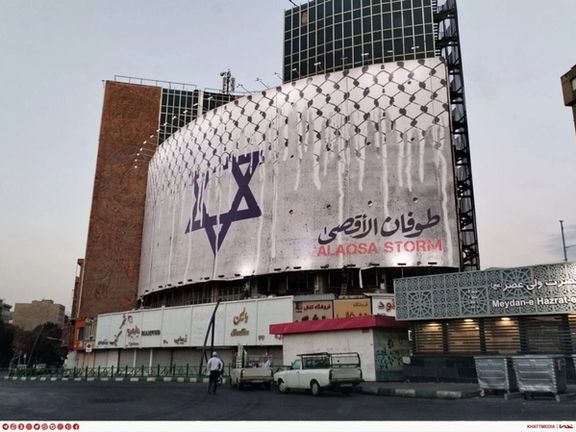
In an earlier statement, Major General Mohammad-Bagheri (Baqeri), Chief of Iranian Armed Forces Staff, had also called the surprise attack on Israel on Saturday, dubbed Al-Aqsa Storm, as a “glorious victory” and said these operations proved that “desperate attempts such as the ridiculous normalization process” would not be able to slow down or prevent Israel’s annihilation.
“Once the stone Intifada (uprising) was the Palestinian nation’s only defense tool, but today Palestinian fighters have reached a level of capability that enables them to deal strong blows to the Zionist enemy in a complex operation and make a mockery of its air defense systems and Iron Dome by firing thousands of rockets and missiles as part of a complex combined operation,” Bagheri said.
Admiral Ali Shamkhani, Secretary of Iran's Supreme National Security Council (SNSC) in a tweet Sunday also called the terror invasion “decisive, unique and successful” and a “real example of legitimate defense against a criminal regime”.
The Islamic Republic’s propaganda apparatus organized street celebrations for “Palestinian victory” in Tehran and other cities Saturday evening but sources in Iran say participants were pro-regime and Revolutionary Guards (IRGC) supporters and their families. Ordinary Iranians kept away from such celebrations; they maintained.
Footage and photos released by state media and pro-regime social media users also strongly suggest that these “celebrations”, even in large cities, were small and hastily organized propaganda events that failed to attract ordinary people who in the past decade have often protested to the regime’s massive expenditures to support its militant allies. Protesters have often chanted slogans such as “Neither Gaza, nor Lebanon. I will only sacrifice my life for Iran”.
A video posted with the caption “Remarkable presence of Esfahan residents in the celebration of Palestine’s victory over Zionist occupiers” shows only dozens of people gathered around a pick-up truck chanting slogans against Israel.
A photo published on X presumably showing “celebrations and happiness of people”, in Gilan-e Gharb, a town of 22,000 in western Iran actually shows a small group of men -- including a cleric, a soldier and others who look like government officials – standing in a line and holding posters of Supreme Leader Ali Khamenei, Qassem Soleimani and the founder of the Islamic Republic Ruhollah Khomeini.
A source in the southwestern city of Ahvaz told Iran International that the IRGC had held celebrations at the main squares of the city. “It was a sad and disconcerting situation,” he said, adding that ordinary people would not join the Revolutionary Guards’ celebrations and passed by ignoring them.
“There were no celebrations in Ekbatan. There were only a couple of places in Tehran where the suppressive Basiji [militias] celebrated,” a resident of Tehran’s defiant Ekbatan neighborhood told Iran International.
The death toll from the Hamas attacks, the most violent since the Yom Kippur (Ramadhan) War in 1973, has reportedly killed at least 600 people in Israel since Saturday.
In Gaza, the death toll of civilians in retaliatory Israeli attacks has risen to more than 370. Israeli military says it has also killed 400 Palestinian militants and arrested dozens.
World leaders including UN Secretary General Antonio Guterres have condemned the attack. Guterres said he was "appalled” by reports of attacks on Israeli civilians and their abduction from their homes.

Iran’s Revolutionary Guard helped devise the terror attack plan that Hamas launched on Southern Israel on Saturday, killing hundreds, the Wall Street Journal has reported.
In an exclusive report on Sunday, the WSJ quoted senior unnamed Hamas and Hezbollah members, who said Iranian officials were involved in planning the large-scale operation and the final decision to launch the operation was made in Beirut October 2.
The Iranian regime has not shied away from signaling its involvement and support to Hamas, which is largely financed and armed by Tehran. Supreme Leader Ali Khamenei, President Ebrahim Raisi and a host of other officials and the state media have widely expressed their satisfaction with the attack.
The fact that senior Hamas and Hezbollah officials spoke about Iran’s direct involvement could be sign of Tehran’s eagerness to show its reach as Israel and Saudi Arabia were on the verge of establishing diplomatic relations. Iran had warned against any normalization with Israel.
Despite the Iranian regime’s open endorsement of the attack and its long-standing material support for Hamas, Secretary of State Antony Blinken on Sunday stated that the United States does not have any evidence of Tehran’s direct involvement.
The Biden administration has come under heavy criticism for continuing diplomatic contacts with the Islamic Republic and agreeing to release $8.7 billion in blocked Iranian funds since June. Critics say that any financial means put at the disposal of the regime will enable it to finance terrorism in the region and the world.
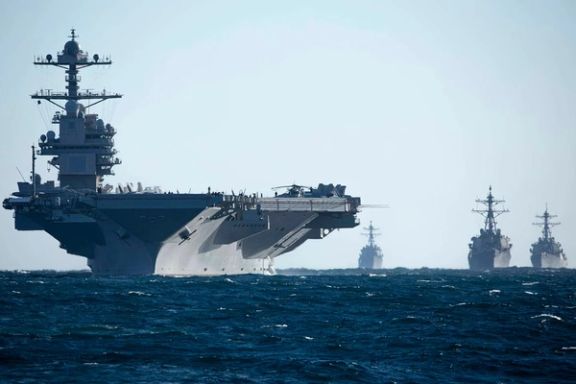
As the death toll from Hamas attack on Israel surpassed 700, the US said it will send multiple warships and aircraft closer to Israel as a show of support.
Hamas fighters rampaged through Israeli towns as the country suffered its bloodiest day in decades on Saturday. Israel battered Gaza with airstrikes on Sunday, inflicting many casualties. Many voiced concern that the spiraling violence can lead to a major new war in the Middle East.
Defense Secretary Lloyd Austin announced the military deployment on Saturday, adding that the US will be rapidly providing the Israel Defense Forces with additional equipment and resources, including munitions, and that its security assistance will begin moving on Sunday and arriving in the coming days.
“I have directed the movement of the USS Gerald R. Ford Carrier Strike Group to the Eastern Mediterranean. This includes the US Navy aircraft carrier USS Gerald R. Ford (CVN-78), the Ticonderoga-class guided missile cruiser USS Normandy (CG 60), as well as the Arleigh-Burke-class guided missile destroyers USS Thomas Hudner (DDG 116), USS Ramage (DDG 61), USS Carney (DDG 64), and USS Roosevelt (DDG 80). We have also taken steps to augment U.S. Air Force F-35, F-15, F-16, and A-10 fighter aircraft squadrons in the region,” Austin said.
“Over the coming days the Department of Defense will work to ensure that Israel has what it needs to defend itself and protect civilians from indiscriminate violence and terrorism,” he said Sunday.
General Michael Kurilla, the Commander of the US Central Command said in a statement, "USCENTCOM stands firmly with our Israeli and regional partners to address the risks of any party seeking to expand the conflict."
US President Joe Biden told Prime Minister Benjamin Netanyahu on Sunday that additional assistance for the Israeli Defense Forces was on its way and more would follow in the coming days, the White House said after their call.
"It wouldn't be a surprise that part of the motivation may have been to disrupt efforts to bring Saudi Arabia and Israel together, along with other countries that may be interested in normalizing relations with Israel," US Secretary of State Antony Blinken told CNN earlier on Sunday.
Blinken also said that there was not yet any evidence seen by the United States of Iran being behind the attack, but he noted the long-standing ties between Iran and Hamas. Blinken's statement contradicts years of evidence which has proven that Iran pays Hamas around $100m annually, as was announced in 2018 by the then Middle East envoy Jason Greenblatt, under the Donald Trump administration.
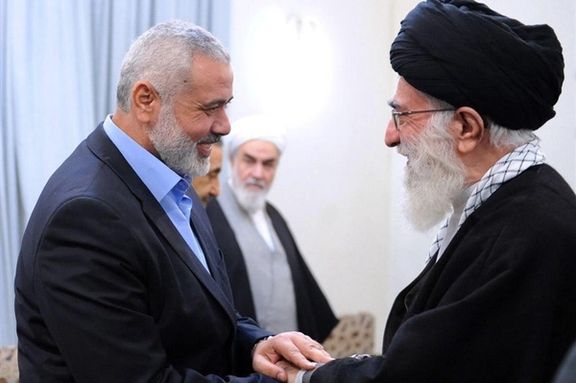
In spite of evidence to suggest the Saturday morning attack which began with a barrage of thousands of rockets fired into Israel's southern region, followed by a land, sea and air invasion of troops, was carefully planned, Blinken tried to suggest the attacks could have been more of an operation orchestrated by militants in Gaza and the Hezbollah in Lebanon.
US Deputy National Security adviser Jon Finer told Fox News Sunday that Saudi-Israel normalization efforts should continue despite the latest attack. "We think it would be in both countries' interests to continue to pursue this possibility," he said.
The attack by Hamas launched at dawn on Saturday is the biggest and deadliest incursion into Israel since Egypt and Syria launched a sudden assault in an effort to reclaim lost territory in the Yom Kippur war 50 years ago.
With reporting by Reuters
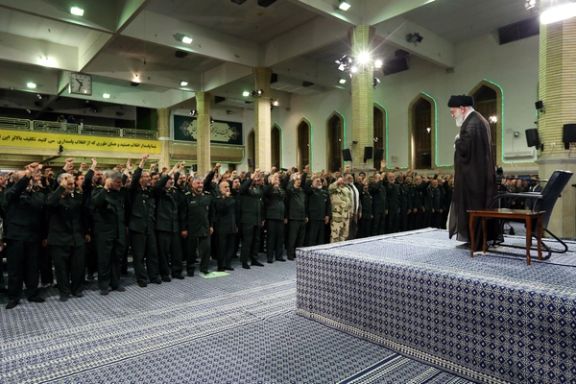
Elon Musk has called on Iran’s Ali Khamenei to change his anti-Israel policy, posting on his social media platform X, where the Iranian ruler also is allowed to have an account.
Musk, speaking out on Sunday after the large-scale terrorist invasion of Israel that has killed more than 700 Israelis, said, “Khamenei’s official position is clear that the eradication of Israel is the actual goal, not just supporting Palestinians,” and added, “That will never happen.”
Khamenei who has multiple accounts on X (formerly Twitter) uses the platform to spread hateful speech. Activists have been long urging both Twitter’s former management and later Elon Musk to ban Khamenei from the platform. However. Khamenei was again to publish a post after the attack on Israel, although a note below the post said it “violated the X Rules,” but the company “determined that it may be in the public’s interest for the Post to remain accessible.”
Musk addressed Islamic Republic’s ruler, saying, “Stoking the fires of hatred isn’t working. Perhaps it is time to consider something else.”
Khamenei and many other Iranian officials over the years have called for the destruction of Israel and for decades have financed and armed militant and terrorist groups in Lebanon, Palestinian territories and other regional countries.
The Iranian regime has congratulated Hamas for its terror attack, while hundreds of Israelis including women and children have been kidnapped and taken to Gaza under inhumane conditions.